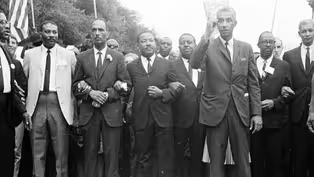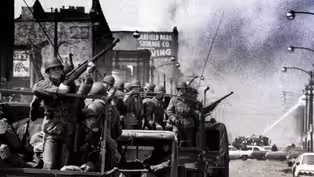Chicago Stories
Life on the West Side
Clip: 10/25/2024 | 4m 40sVideo has Closed Captions
African Americans settle on Chicago’s West Side.
Amid the Great Migration, the Black population on Chicago’s West Side grew. But segregation took its toll.
Problems playing video? | Closed Captioning Feedback
Problems playing video? | Closed Captioning Feedback
Chicago Stories is a local public television program presented by WTTW
Lead support for CHICAGO STORIES is provided by The Negaunee Foundation. Major support is provided by the Abra Prentice Foundation, Inc. and the TAWANI Foundation.
Chicago Stories
Life on the West Side
Clip: 10/25/2024 | 4m 40sVideo has Closed Captions
Amid the Great Migration, the Black population on Chicago’s West Side grew. But segregation took its toll.
Problems playing video? | Closed Captioning Feedback
How to Watch Chicago Stories
Chicago Stories is available to stream on pbs.org and the free PBS App, available on iPhone, Apple TV, Android TV, Android smartphones, Amazon Fire TV, Amazon Fire Tablet, Roku, Samsung Smart TV, and Vizio.
Providing Support for PBS.org
Learn Moreabout PBS online sponsorship- I was born in Roanoke, Virginia.
My household was a single parent household, just my mom and her six kids.
You hear about the Jim Crow South, separate but equal.
White water fountains, Black water fountains, not being able to get served at certain restaurants, all these type of things.
My mother, her family, had all migrated from Mississippi and they told her, "Well, come to Chicago."
- [Narrator] John Preston and his family migrated to Chicago in the late 1950s, and they were not alone.
After World War II, four million Blacks headed north, fleeing violence and looking for work.
A quarter million of them settled on Chicago's West Side.
Jobs were plentiful thanks to local manufacturers like Zenith, Western Electric and Brach's Candy.
- And they hired a lot of Black fathers.
And so you can go in one factory, get a job, quit and walk down the street and get another job.
- [Narrator] They became the backbone of the city's industrial might and spent their paychecks at white-owned stores in shopping districts along Madison Street and Roosevelt Road.
- This is where all the Blacks in that area would go shopping at.
You had Robert Halls, that's where most men go get their Easter suits at.
- [Narrator] They made a life for their families.
- It was a good childhood, having real friends, having neighbors who would invite you in, feed you, you know, with their children.
Just growing up in a good environment of love.
(explosion pops) - [Narrator] But Chicago was deeply segregated, and surrounding white communities were not welcoming.
- You'd see things in the boundaries of Chicago, where you want to go live at?
But no, that's a white neighborhood.
That's a Black neighborhood.
- You didn't hardly go past Cicero Avenue.
That was kind of the end of the Black community.
- I can remember catching the bus up to Riverview, wind up spending all your money.
You couldn't even get back home.
You had to walk back through those neighborhoods.
And getting chased by white kids because you're Black.
- I learned what racism was, what white supremacy was just from being on the track team.
Our uniforms were ragged hand-me-downs, and then when you go to a place like Palatine and you see these pristine uniforms, it was a thing of wanting to have that.
- [Narrator] And as the Black population grew, the white residents of the west side moved out.
- When I was, I think in eighth grade, the white kids left.
- As a result of that, you had massive school segregation.
- Black schools had no pieces of chalk, for example.
- I remember clear as day, they took away our playground.
- Remarks by teachers, "You people this," or, "you people might act like monkeys."
- [Eig] You had massive job segregation and discrimination in hiring.
- [Narrator] And the industrial jobs that had lured Black workers to Chicago were also leaving town.
- [Balto] By the late 1960s, 60% of those jobs are gone.
- [Daley] They went to the suburbs or moved down south and people lost their jobs.
- We understand the meaning of the word lack.
- [Narrator] By the spring of 1968, after a decade of white flight and disinvestment, the once vibrant west side was in crisis.
A presidential commission that examined urban areas across the country put it plainly.
Our nation is moving toward two societies, one Black, one white, separate and unequal.
- The famed Black sociologist St. Clair Drake said that the city of Chicago should be grateful for the fact that Black people had exercised such restraint.
Video has Closed Captions
Clip: 10/25/2024 | 3m 15s | Martin Luther King moved to Chicago to bring attention to housing conditions. (3m 15s)
Video has Closed Captions
Clip: 10/25/2024 | 4m 23s | The National Guard arrives on Chicago’s West Side. (4m 23s)
Providing Support for PBS.org
Learn Moreabout PBS online sponsorshipSupport for PBS provided by:
Chicago Stories is a local public television program presented by WTTW
Lead support for CHICAGO STORIES is provided by The Negaunee Foundation. Major support is provided by the Abra Prentice Foundation, Inc. and the TAWANI Foundation.

















